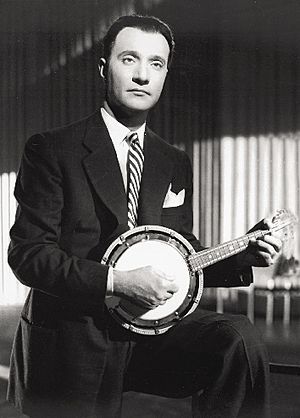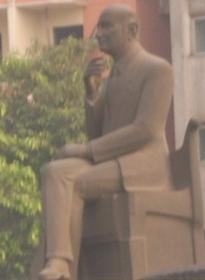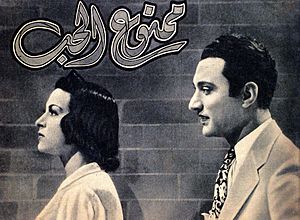Mohammed Abdel Wahab facts for kids
Quick facts for kids
Mohammed Abdel Wahhab
|
|
|---|---|

Mohammed Abd el-Wahhab with a cümbüş (mandolin)
|
|
| Background information | |
| Born | March 13, 1901 Cairo, Egypt |
| Origin | Egypt |
| Died | May 4, 1991 (aged 90) Cairo, Egypt |
| Genres | Egyptian music |
| Occupation(s) |
|
| Instruments |
|
| Years active | 1917–1991 |
| Labels | Mazzika |
Mohamed Abdel Wahab (Arabic: محمد عبد الوهاب), also transliterated Mohamed Abd El-Wahhab (March 13, 1901 – May 4, 1991), was a prominent 20th-century Egyptian singer, actor, and composer. He's best known for his Romantic and Egyptian patriotic songs.
He was known of his Egyptian nationalist and revolutionary songs like "Ya Masr tam El-Hanna" (Oh Egypt, happiness is here), "Hay Ala El-Falah" (The call of duty), "El Watan El Akbar", "Masr Nadetna falbena El-nedaa" (Egypt has called us and indeed we answered the call), "Oulo le Masr" (Tell Egypt), "Hob El-watan Fard Alyi", "Sout El-Gamaheer", "Ya Nessmet El-Horria" (The breeze of Freedom), "Sawae'd men Beladi".
He also contributed and composed the national anthems of Tunisia, "Humat al-Hima", The United Arab Emirates, "Īsiy Bilādī", and "Libya" which was from 1951 to 1969 and again since 2011.
Contents
Life

Mohamed Abdel Wahab was born in 1902 in Cairo, Egypt, in a neighborhood called Bab El-Sheriyah, where there is now a statue of him. He began his singing career at an early age and made his first public performances at age seven at local productions. He was 13 when he made his first recording. Mohamed Abdel Wahab was a very close friend to compatriot singer Abdel Halim Hafez.
Film career
In 1933, Abdel Wahab began composing his own style of Egyptian film musical after visiting Paris and familiarizing himself with French musical film. He introduced a lighthearted genre of musical film to Egyptian culture eventually composing eight musical comedies between 1933 and 1949. His films portrayed Western social elite and included music that veered off from the traditional Egyptian tune. He starred in his 1934 film The White Flower which broke records in attendance and still plays frequently in Egyptian theaters. In 1950 Abdel Wahab left film to focus on being a more profound singer.
Contribution to Egyptian and Arabic music
Abdel Wahab composed more than 1820 songs. Abdel Wahab is considered to be one of the most innovative Egyptian musicians of all time, laying the foundation for a new era of Egyptian music with his use of non-local rhythms and refined oud playing.
Despite the fact that Abdel Wahab composed many songs and musical pieces of classical Arabic music, he was notably criticized for his orientation to Western music. In fact, he introduced Western rhythms to Egyptian songs in a way appropriate to the known then very classical forms of Egyptian songs. For example, in 1941, he introduced a waltz rhythm in his song "El Gandol," and, in 1957, he introduced a rock and roll rhythm in Abdel Halim Hafez's song "Ya Albi Ya Khali".
He composed some of the best hits of Nagat El Saghira, including four poems by Nizar Qabbani.
Abdel Wahab played oud before the prominent Egyptian poet, Ahmed Shawqi, and acted in several movies. He composed ten songs for Umm Kulthum. He was the first Egyptian singer to move from silent-era acting to singing.
Abdel Wahab also composed songs for the Lebanese icon Fairuz whom he famously called "Our Ambassador to the Stars" and stated in the 1950s that he was the leader of her fan club in Cairo.
Death
Mohamed Abdel Wahab died in his hometown Cairo, Egypt of a stroke on May 4, 1992.
Legacy
Abdel Wahab was fundamental in establishing a new era of Egyptian music in his homeland and across the Arab world. He also left a mark on the Western world by exposing Egyptian music to Western classical and popular traditions.
He composed the Tunisian (Humat al-Hima) and Libyan (Libya, Libya, Libya) national anthems.
Tribute
On March 13, 2012, Google celebrated his 110th birthday with a Google Doodle.
Filmography
- As actor
- The White Rose (1933)
- Doumou' el Hub (Love's Tears) (1936)
- Yahya el Hub (Long Live Love) (1938)
- Yawm Sa'id (Happy Day) (1939)
- Mamnou'a el Hub (Love Is Forbidden) (1942)
- Rossassa Fel Qalb (A Bullet in the Heart) (1944)
- Lastu mallakan (I'm No Angel) (1947)
- Ghazal Al Banat (The Flirtation of Girls) (1949)
Honours
Egyptian national honours
| Ribbon bar | Honour |
|---|---|
| Grand Cordon of the Order of the Nile | |
| Commander of the Order of the Arab Republic of Egypt | |
| Grand Cross of the Order of Merit (Egypt) |
Foreign honors
| Ribbon bar | Country | Honour |
|---|---|---|
| Grand Cordon of the Supreme Order of the Renaissance | ||
| Commander of the National Order of the Cedar | ||
| Collar of the National Order of Libya | ||
| Grand Cross of the Order of Ouissam Alaouite | ||
| First Class of the Order of Oman | ||
| Grand Cordon of Order of Civil Merit of the Syrian Arab Republic | ||
| Grand Cordon of the Order of the Republic of Tunisia |
See also
 In Spanish: Mohammad Abdel Wahab para niños
In Spanish: Mohammad Abdel Wahab para niños


